
Prepare Oracle Database SQL (1Z0-071) certification
Get ready to pass the Oracle Database SQL (1Z0-071) exam
Test your knowledge in Oracle Database SQL (1Z0-071)
Full coverage of the Oracle Database SQL (1Z0-071) certification
JOIN NOW AND PREPARE, YOU WON’T REGRET IT!
The official exam knowledge criteria are regularly checked to make sure that the practice questions reflect the most recent standards. Content updates are frequently made without prior notice and are always subject to change.
The majority of questions include thorough justifications and references to further reading, so the answers are always accurate.
Every time you take the tests again, the questions will be different, so you’ll need to understand why an answer is right rather than merely remembering that item “B” was the right response the last time you took the test.
What’s covered in the Practice Tests:
Relational Database concepts
- Explaining the theoretical and physical aspects of a relational database
- Relating clauses in SQL Select Statement to Components of an ERD
- Explaining the relationship between a database and SQL
Retrieving Data using the SQL SELECT Statement
- Using Column aliases
- Using The SQL SELECT statement
- Using concatenation operator, literal character strings, alternative quote operator, and the DISTINCT keyword
- Using Arithmetic expressions and NULL values in the SELECT statement
Restricting and Sorting Data
- Applying Rules of precedence for operators in an expression
- Limiting Rows Returned in a SQL Statement
- Using Substitution Variables
- Using the DEFINE and VERIFY commands
- Sorting Data
Using Single-Row Functions to Customize Output
- Manipulating strings with character functions in SQL SELECT and WHERE clauses
- Performing arithmetic with date data
- Manipulating numbers with the ROUND, TRUNC and MOD functions
- Manipulating dates with the date function
Using Conversion Functions and Conditional Expressions
- Applying the NVL, NULLIF, and COALESCE functions to data
- Understanding implicit and explicit data type conversion
- Using the TO_CHAR, TO_NUMBER, and TO_DATE conversion functions
- Nesting multiple functions
Reporting Aggregated Data Using Group Functions
- Restricting Group Results
- Creating Groups of Data
- Using Group Functions
Displaying Data from Multiple Tables
- Using Self-joins
- Using Various Types of Joins
- Using Non equijoins
- Using OUTER joins
- Understanding and Using Cartesian Products
Using Subqueries to Solve Queries
- Using Single Row Subqueries
- Using Multiple Row Subqueries
- Update and delete rows using correlated subqueries
Using SET Operators
- Matching the SELECT statements
- Using the ORDER BY clause in set operations
- Using The INTERSECT operator
- Using The MINUS operator
- Using The UNION and UNION ALL operators
Managing Tables using DML statements
- Managing Database Transactions
- Controlling transactions
- Perform Insert, Update and Delete operations
- Performing multi table Inserts
- Performing Merge statements
Managing Indexes Synonyms and Sequences
- Managing Indexes
- Managing Synonyms
- Managing Sequences
Use DDL to manage tables and their relationships
- Describing and Working with Tables
- Describing and Working with Columns and Data Types
- Creating tables
- Dropping columns and setting column UNUSED
- Truncating tables
- Creating and using Temporary Tables
- Creating and using external tables
- Managing Constraints
Managing Views
- Managing Views
Controlling User Access
- Differentiating system privileges from object privileges
- Granting privileges on tables
- Distinguishing between granting privileges and roles
Managing Objects with Data Dictionary Views
- Using data dictionary views
Managing Data in Different Time Zones
- Working with CURRENT_DATE, CURRENT_TIMESTAMP,and LOCALTIMESTAMP
- Working with INTERVAL data types
There is no requirement for previous practical Oracle Database product expertise for the Oracle Database Foundations Certified Foundations Associate test. But in order to succeed, you must have a fundamental knowledge of the many kinds of database structures and parts. Additionally, you must be familiar with the mapping of the ERD model into relations and the various types of relationships that exist between columns in order to alter data using SQL queries.
You should not rely solely on our practice exams to help you learn for the Oracle Database SQL 1Z0-071 Practice Exam.






